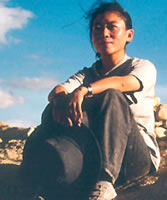
Tibet’s most well-known writer and commentator, Woeser.
Woeser’s latest poem, ‘Fear in Lhasa’, describes how the fear in the city today is greater than at the time of three key events in Tibet’s contemporary history – the Lhasa Uprising, which led to the Dalai Lama’s escape into exile in March 1959, the Cultural Revolution, and the imposition of martial law in March 1989. Woeser wrote the poem two days after being held and questioned by police for eight hours and accused of taking photographs during a brief trip home to Lhasa with her husband in August. The police searched her mother’s home and removed several documents as well as Wang Lixiong’s computer.
Woeser writes: “A hurried farewell to Lhasa/Where the fear starts at the Potala and strengthens as you go east, through the Tibetans’ quarter/Dreadful footsteps reverberate all round, but in daylight you won’t glimpse even their shadow/They are like demons invisible by day, but the horror is worse, it could drive you mad/ A few times I have passed them and the cold weapons in their hands.” (For a full translation, see: www.raggedbanner.com).
After being repeatedly denied a passport for three years, Woeser launched a lawsuit against the government demanding to be given the document she needs to travel outside the country. In an interview with the Associated Press in Beijing in July, Woeser said that the lawsuit was another way to draw attention to the unfair treatment of Tibetans over the years.
Professor Tsering Shakya, an expert in contemporary Tibetan writing, compares Woeser’s situation to that of the late Russian dissident writer, Solzhenitsyn, saying: “It is the duty of courageous writers to speak of the unspeakable and lift the veil from the dark corners where horror is hidden…The events of March 2008 created a new memory and it will be narrated from generation to generation. Today, memory is no longer hidden…but advertised in cyberspace to share with the rest of the world – and in this respect Woeser occupies a unique position as chronicler of modern Tibetan memory. Her blog [and writings] have become the voice of Tibet.”
Woeser was born in Lhasa, but grew up speaking Chinese after her father, who served in the People’s Liberation Army, was transferred to a Tibetan area in Sichuan Province. As a member of the privileged elite, she was later admitted to a Chinese literature program for minority nationalities. It was only when she moved back to Lhasa as a young woman, where she worked as an editor for the leading Tibetan literary magazine, that she began to discover the reality of Tibet’s past and to learn about Tibetan Buddhism. This coincided with the death of her father, who had been a deputy commander in the army, and the realization that he had secretly been a Buddhist, a story documented in the poem, ‘A Mala that was Meant to Be’. In another poem, ‘Tibet’s Secret’, Woeser writes about reading former political prisoner Palden Gyatso’s autobiography and reflects on Tibetan monks and nuns enduring long prison terms for peaceful protests: “With shame I count down their practically endless prison terms/Tibet’s true hearts beat steadfast in a Hell that’s all too real”.
While in Lhasa, Woeser (who, like many Tibetans, is known by just one name) began to document the effects of religious repression, massive immigration of Chinese and unbalanced economic development. In 2004, after her book ‘Notes on Tibet’ was banned, she was informed that all her working hours would be devoted to political re-education. She moved to Beijing, and she later married Wang Lixiong, an author and commentator on Tibet who has been outspoken in his support for human rights and his willingness to take seriously the needs and concerns of Tibetans. In various ground-breaking essays, Wang Lixiong has outlined why he thinks that the Dalai Lama is the key to resolve the question of Tibet, and in March he was a signatory to a letter urging dialogue between Chinese leaders and the Dalai Lama, so as to “eliminate animosity and bring about national reconciliation”.(ICT report, Leading Chinese Intellectuals Ask China to Rethink Tibet Policy – March 22, 2008).
Woeser has published almost daily updates and comments online since March, when an overwhelmingly peaceful uprising across the Tibetan plateau transformed the political landscape. At the height of the protests, more than 3 million internet users visited Woeser’s blog, and her daily updates were translated into numerous languages. The personal stories she includes in her writing – the blind monk who committed suicide, the lama who was beaten when he tried to prevent a protest from escalating – bring home to the outside world the reality of the current crackdown in Tibet and its deeper significance.
- ‘Tibet’s True Heart’, Woeser’s new collection of poetry, translated from Chinese and with comprehensive notes, can be purchased online for $22 plus shipping from www.raggedbanner.com
- There will be a discussion of Woeser’s work in Washington, DC, on October 14. For details contact [email protected]
- A video showing American writer Martha Southgate reading Woeser’s work for an American PEN event can be viewed on YouTube »

